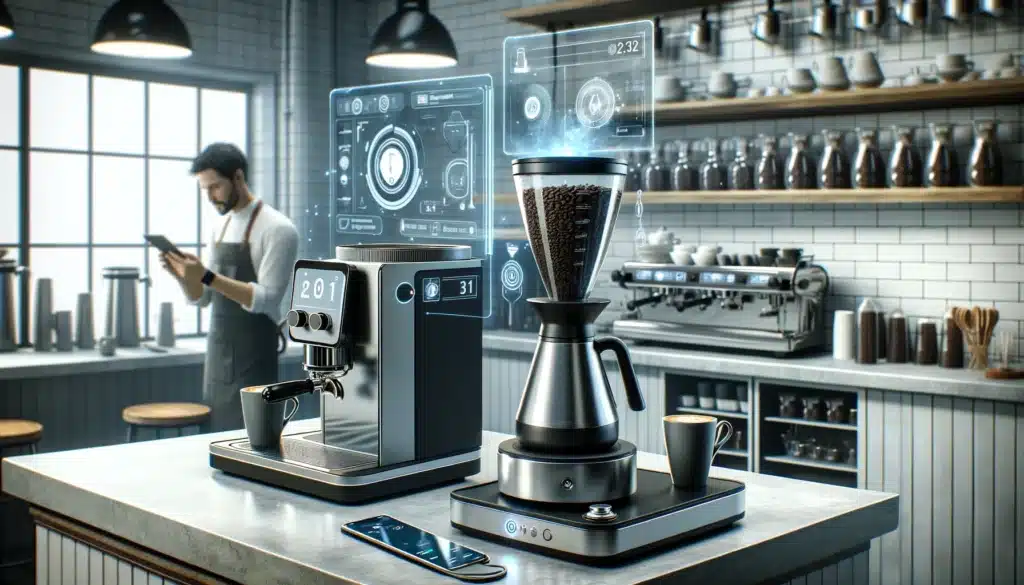Technology is revolutionizing every aspect of the coffee industry — from the farm to the café to your morning cup. Innovations in technology are helping improve quality, efficiency, and sustainability in coffee production, while also creating new ways for consumers to experience and enjoy their favorite brew.
In this article, we explore the ways technology is transforming coffee production, brewing methods, and consumption patterns across the globe.
1. Precision Farming and Coffee Quality
On the production side, coffee farmers are increasingly using precision farming technologies to improve both yield and quality. These include:
- GPS mapping and drones to monitor coffee farms from above
- Sensors to measure soil health, moisture levels, and temperature
- Automated irrigation systems that reduce water usage and ensure optimal growing conditions
By applying data-driven techniques, farmers can increase the consistency and quality of their coffee while minimizing environmental impact.
2. Climate-Smart Coffee Farming
As climate change impacts coffee-growing regions, technology is being used to create climate-resilient coffee farms. Innovations include:
- Drought-resistant coffee plants that can withstand extreme weather conditions
- Greenhouses and climate-controlled environments to protect young coffee plants
- Data analytics to predict and mitigate the effects of temperature changes on harvests
These technologies help farmers adapt to changing climates, ensuring the future of coffee production.
3. Roasting Innovations
Roasting is a critical stage in coffee production that affects flavor, aroma, and overall quality. Technology is improving roasting precision through:
- Roasting software that tracks and controls temperature, time, and airflow for optimal results
- Data-driven roasting profiles that allow roasters to replicate consistent flavors across batches
- IoT-connected roasting machines that provide real-time data for more accurate control
These innovations are helping roasters create more consistent, flavorful coffee while reducing waste and improving energy efficiency.
4. Smart Brewing Equipment
When it comes to brewing coffee, technology is enhancing the experience with smart brewing equipment that allows for more precision, customization, and convenience. Key innovations include:
- App-controlled coffee makers that let you adjust brewing parameters like temperature, grind size, and brew time
- Automatic grinders that measure coffee dose and grind size for perfect consistency
- Pour-over kettles with temperature control and adjustable pour speed for enhanced brewing precision
These tools enable consumers to brew coffee just like the professionals, with consistent results every time.
5. Cold Brew and Nitro Coffee
Cold brew coffee and nitro coffee (coffee infused with nitrogen gas) are examples of how technology is changing the way we drink coffee:
- Cold brew coffee machines use automated systems to brew coffee at a low temperature for extended periods, ensuring smooth, low-acid flavors
- Nitro coffee dispensers use nitrogen-infused tanks to create a creamy, frothy texture in coffee, offering a beer-like experience without alcohol
Both trends are driven by consumer demand for new coffee experiences and more innovative flavors.
6. Coffee Subscription Services
Technology has transformed how people access coffee, with the rise of coffee subscription services. These services use data to curate personalized coffee selections based on:
- Roast preferences (light, medium, dark)
- Tasting notes (fruit, chocolate, floral)
- Grind size (whole bean or pre-ground)
Subscriptions offer customers the convenience of regular delivery and the excitement of trying new blends, beans, and roasters each month.
7. The Rise of Coffee Pods and Single-Serve Machines
Single-serve coffee makers, like the Keurig and Nespresso machines, are a technological breakthrough that allows consumers to brew coffee with ease and minimal waste. These systems use:
- Coffee pods that are pre-measured and sealed for freshness
- Automatic brewing that ensures a consistent cup of coffee each time
- Convenience for busy consumers who value speed and simplicity
While convenient, these systems have raised concerns about environmental impact, leading to innovations in compostable pods and recyclable materials.
8. The Digitalization of Coffee Shops
In the café industry, technology is improving both the customer experience and operational efficiency. Examples include:
- Mobile apps that allow customers to place orders in advance or skip the line
- Digital menus and contactless payments for safer and more efficient service
- Data analytics to track sales, customer preferences, and inventory in real time
These innovations make cafés more streamlined, while also enhancing the overall customer experience.
9. AI and Machine Learning in Coffee
Artificial intelligence (AI) and machine learning are helping both coffee farmers and roasters enhance quality control and operational efficiency. Key applications include:
- AI-powered taste analysis that evaluates coffee flavors and helps roasters improve profiles
- Predictive analytics for forecasting coffee production yields and quality
- Machine learning to optimize roasting profiles and brewing techniques based on data from previous batches
As AI technology becomes more advanced, it will continue to refine coffee production at all levels of the supply chain.
10. The Future of Coffee Technology
The future of coffee technology looks bright, with innovations on the horizon, such as:
- Blockchain technology to ensure traceability in the coffee supply chain
- Sustainable packaging innovations to reduce waste
- Automated coffee brewing stations in cafés for consistent, high-quality coffee at scale
Technology is set to continue transforming how we grow, produce, and consume coffee, making it more sustainable, efficient, and enjoyable.
Final Thoughts: A New Era for Coffee
As technology continues to evolve, so too will the coffee industry. From smarter brewing equipment to climate-resilient farms, innovation is driving positive change. By embracing these advancements, we can look forward to a future where coffee is more sustainable, more efficient, and more accessible to everyone.







